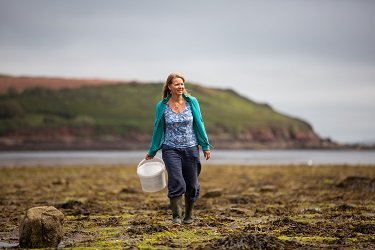 As featured in the Port's newsletter, OnBoard, Summer 2020.
As featured in the Port's newsletter, OnBoard, Summer 2020.
We all assume that someone is out there making sure Pembrokeshire’s renowned coast and shorelines are protected and well understood. However, many would be surprised how few people are on the front line, helping sensible decisions to be made that balance the needs of humans on the one hand, and the habitats and species that make our waters internationally important sites on the other.
Sue Burton is the Special Area of Conservation (SAC) Officer employed and hosted by the Port of Milford Haven. She works on behalf of a wider partnership of local organisations to help to facilitate any tensions between the various agencies and businesses operating in our waters, and the voiceless flora and fauna with which they must coexist.
Born in south Devon and a marine biologist by training, Sue travelled widely both as a professional diver and wildlife expert before coming to south west Wales.
It was a small advert for a seasonal post working at the Skomer Marine Nature Reserve (now a Marine Conservation Zone) that brought her to Pembrokeshire. There she worked as a conservation diver and fell in love with the place.
“I found Pembrokeshire very much like a home from home; like Devon but without the crowds, which suited me just fine,” explains Sue as we walk across the gravel flats of the Gann in Dale.
Sue stops suddenly and stoops to pick something up. “It’s my favourite shell, a Turban Top Shell [sea snail]. It’s just so beautiful,” she enthuses. You don’t have to talk long with Sue to get a strong sense of her love for the world below high water. “The reason why Pembrokeshire is so special is it offers such variety of marine life,” she says, her eyes constantly casting around her for more interesting finds. “We have warm water from the Gulf Stream meeting the cold waters from the north, so we tend to get a taste of both worlds,” she explains. “And we have a range of geology that results in different communities living on and around the rocks. But we’ve also got varying levels of exposure, from the wild open coastline, which is battered by waves, to the wonderful Milford Haven waterway, which is a beautiful sheltered ria.” Sue’s obvious love for getting outdoors is frustrated only by the amount of desk-based work she has to do. But that doesn’t dampen her enthusiasm.
“I think the variety of my work is what I love. I do get frustrated that I have to spread myself thinly across various areas, but on the plus side, one minute I could be dealing with fisheries, the next looking at water quality and the next it could be looking at the impact of a particular recreational activity.”
To ensure the careful management of our waters, Sue works with all the potentially competing interests that occupy or move through these special spaces. How does she think we manage the balance between human activity and nature?
“I think much better than we have done in the past but there is still room for improvement,” she replies after some thought. She points upriver towards the chimneys of Valero refinery. “A working port has to be maintained and there’s industry here that’s very important to UK needs. I think increasingly industries are making more effort.” What human impact causes her most concern? “All our cumulative actions that affect water quality. Run off from the land contains not only sediments, but nitrates and phosphates. Then there are also pesticides, detergents, even pharmaceuticals - all the pills that people pop - that all end up in the marine environment. The worry is not only the poor water quality that results, but the fact that the impacts are so wide ranging,” she adds.
Sue is Britain’s longest serving dedicated SAC Officer. She has, as she happily points out, spent nearly half her life here in Pembrokeshire. As a result, she is known and respected by people and businesses operating the length of the Waterway and beyond. But her particular passion is for education. She places high value on producing resources for helping young and old learn more about the world (find her on social media - details below). “Without education there is no understanding. Without understanding there can be no appreciation and without appreciation there can be no protection.” Does she think we appreciate what we have in Pembrokeshire? “Not everybody. I was shocked to find out from teachers how few children in Pembrokeshire have been to a beach. How is that possible??” she says, with obvious exasperation, as she looks down the beach towards the Waterway. “It’s very sad. But I think our recent lockdown experience has forced people to explore their locality. Even the most unassuming stretch of shore can offer an adventure”.
You can follow Sue’s work on Twitter: @pembsmarinelife or on Facebook
@Pembrokeshiremarinewildlife: There are also challenging quizzes to test your knowledge - or your kids’ - of marine wildlife.


